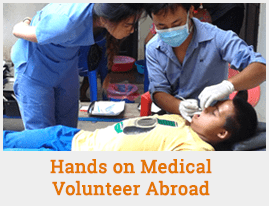VOLUNTEER IN COSTA RICA
' I LOVE this experience in chitwan for though short period! '
Xue Ying Fiona WangCosta Rica Sea Turtle and Mangrove Conservation Volunteer Program
The Most Affordable
Volunteer fees starting at just
$320
The Most Reputed
Since 1998, over 18,000 Volunteers, hundreds of online reviews
The Most Transparent
No Middlemen. Pay your fees directly to host families and projects.
Project Summary
Costa Rica, nestled in Central America, captivates visitors with its breathtaking natural beauty and extraordinary biodiversity. However, amidst this splendor, the country faces challenges in preserving its coastal habitats, particularly endangered sea turtles and mangroves.
Illegal activities such as poaching and habitat destruction threaten these vital ecosystems, placing them at risk of extinction. Protecting these charismatic animals is essential for safeguarding Costa Rica's natural heritage.
RCDP offers an opportunity for passionate conservationists to make a tangible impact through their turtle and mangrove conservation project. By joining this initiative, volunteers provide invaluable support to protect these critically endangered species and their habitats.
This hands-on experience allows volunteers to contribute directly to the preservation of Costa Rica's coastal ecosystems, making it a uniquely rewarding opportunity to give back to the world. Contact RCDP today to learn more about how you can participate in this impactful program.
Volunteer Responsibilities & Impact
- Take on a crucial role in safeguarding sea turtles and mangroves, species threatened by illegal activities and habitat destruction, to preserve Costa Rica's natural heritage.
- Monitor sea turtles in their natural habitat, identifying resident turtles and recording scientific data to aid in conservation efforts.
- Care for weak or injured sea turtles at the project's rescue and rehabilitation center, providing a calm and comfortable environment for their recovery.
- Participate in mangrove reforestation initiatives by collecting seeds, planting juvenile plants, and maintaining the nursery to restore vital habitats.
- Assist project staff with various tasks, including organizing equipment, maintaining cleanliness, and aiding in research activities to support conservation efforts.
- Adhere to safety protocols and guidelines provided by project staff to ensure the well-being of volunteers and the animals under their care.
Skills and Qualifications:
Though not required, having a basic understanding of Spanish can be helpful. It's also recommended to take a proactive approach to fully engage in the volunteer experience. Volunteers are encouraged to be proactive, outgoing, and contribute whenever possible. Consistent attendance and sticking to schedules are important for maximizing the impact of both volunteers and their projects.
Please be aware that beach patrols involve a lot of walking on sandy terrain. Therefore, volunteers should be physically fit and prepared for this aspect of the task.
Accommodation and Meal
During project days, volunteers will receive two daily meals provided in shared group housing. Accommodation options include dormitory-style living or upgraded private accommodations for those seeking added comfort. Additionally, participants will benefit from educational presentations and practical training to guide them through their tasks.
 1-2543048951
1-2543048951


